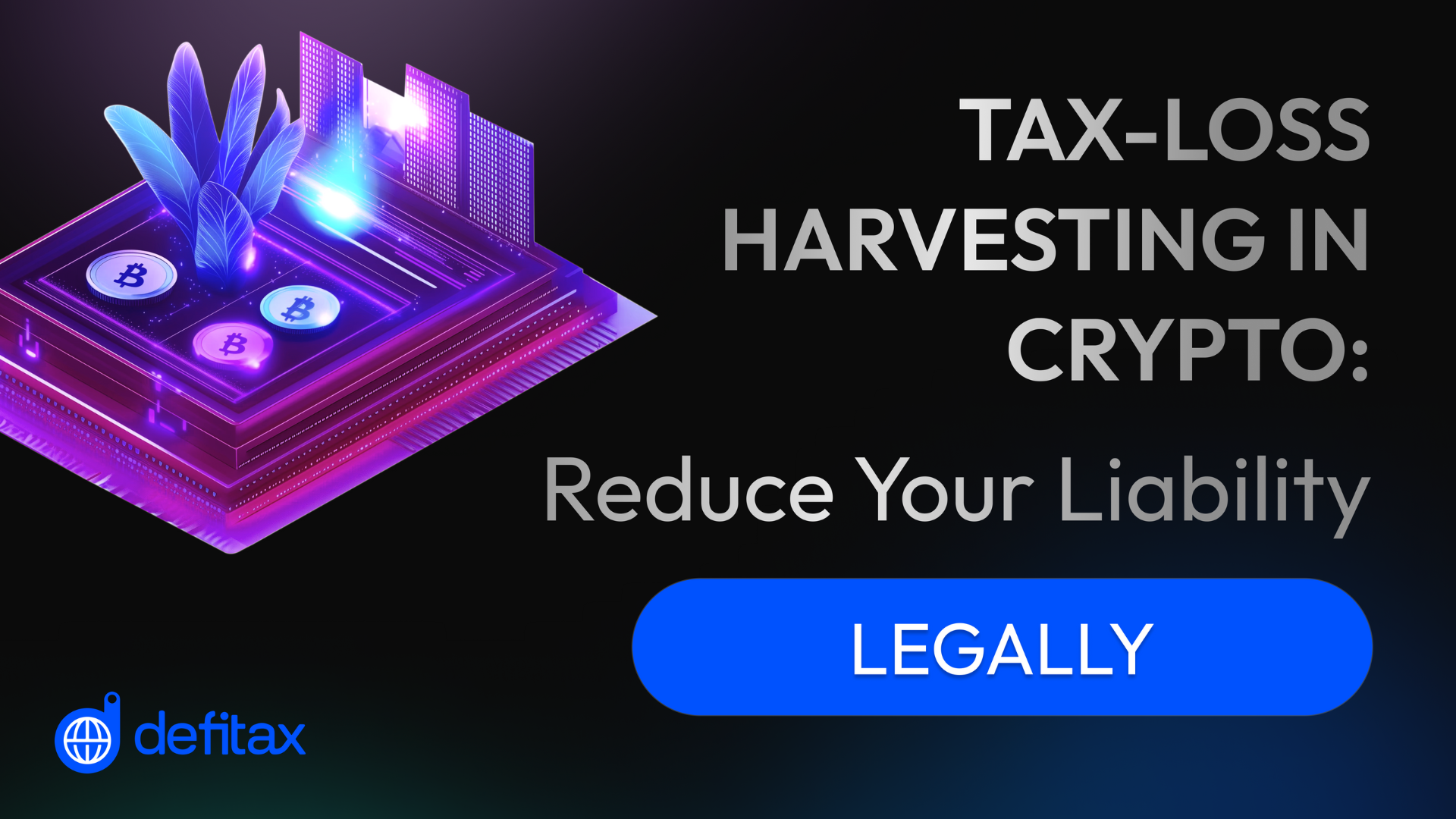
In crypto, price swings are part of the game. But if you’ve experienced losses this year, don’t just HODL in silence, turn those losses into legal tax savings.
Crypto tax-loss harvesting is a powerful IRS-compliant strategy that allows you to offset gains with losses, reduce your taxable income, and stay ahead of crypto tax regulations. But like everything in crypto, the rules are different, and mistakes can cost you.
At DeFi Tax, we make sure you stay compliant while maximizing the benefits of every trade. In this guide, we’ll break down what tax-loss harvesting is, how to use it legally, and how to avoid common pitfalls (like breaking the crypto wash sale rule that’s gaining IRS attention).

Crypto tax-loss harvesting is the process of intentionally selling crypto assets at a loss to offset capital gains and reduce your overall tax bill. It allows you to:
This is one of the most effective IRS-compliant strategies for reducing crypto tax liability.
Example: Let’s say you made $15,000 selling Ethereum but lost $7,000 in Solana. Tax-loss harvesting lets you report the loss to reduce your taxable gains to $8,000—which could lower your tax bill by thousands.
The IRS allows capital losses to be used to offset capital gains. This applies to stocks, real estate, NFTs, and crypto.
But unlike stocks and ETFs, crypto has one major advantage: it’s not currently subject to the wash sale rule. That means you can:
This strategy is a legal crypto tax loophole—one that may not last much longer. Congress has discussed expanding the wash sale rule to include digital assets. That’s why now is the time to act.

The IRS wash sale rule prohibits investors from selling a security at a loss and repurchasing a “substantially identical” asset within 30 days. If you do, you lose the ability to claim that loss.
But here’s the good news:
The wash sale rule only applies to securities. And according to the IRS (for now), crypto assets are treated as property, not securities.
So unless Congress updates the tax code, you can:
Be Cautious:
Before you begin selling off crypto to save on taxes, you need to understand the rules and risks:
Crypto must be classified as a capital asset (e.g., held for investment purposes). Staking rewards, airdrops, or freelance payments are considered income—not eligible for capital loss deductions.
The IRS requires detailed documentation of:
With DeFi Tax, all of this is tracked automatically.
Your harvested losses should be reported per transaction and categorized as either short-term or long-term.
The savings from crypto tax-loss harvesting can be significant, depending on your situation. For example, a high-gain investor who realizes $20,000 in capital gains and harvests $12,000 in crypto losses would reduce their net taxable gain to $8,000—potentially saving up to $3,600 depending on their tax bracket. For freelancers or individuals without capital gains, the IRS still allows up to $3,000 in losses to be deducted from ordinary income each year, with any remaining loss—such as the second $3,000 from a $6,000 loss, carried forward to reduce future tax liability.
Whether you’re a full-time trader or a side hustle freelancer, tax-loss harvesting can be a powerful strategy for reducing your crypto tax liability legally.
At DeFi Tax, we’ve taken the guesswork out of tax-loss harvesting by building a platform that’s intelligent, integrated, and IRS-ready. With real-time portfolio analysis, you can instantly view your unrealized losses and gains across all your wallets and exchanges—helping you decide exactly what to harvest and when. Our multi-chain, multi-wallet syncing supports major platforms like Coinbase, Binance, MetaMask, and Ledger, while automatically maintaining your cost basis and transaction history with precision.
When it’s time to file, you can instantly generate audit-ready reports for IRS Form 8949 and Schedule D, backed by a methodology already recognized by the IRS and SEC. And if the IRS ever comes knocking, our optional audit protection service ensures you’re covered with expert representation and complete documentation support.
Tax-loss harvesting is one of the most effective—yet underused—tools for reducing crypto tax liability. When done correctly, it not only minimizes what you owe but also positions your portfolio for long-term success, all while staying fully compliant with IRS crypto tax regulations. With DeFi Tax, you’re not just harvesting losses—you’re building a smarter, safer strategy.
With DeFi Tax, you get:

Q1: Is crypto tax-loss harvesting legal?
Yes. The IRS allows capital losses to offset gains. Crypto is not subject to the wash sale rule, making this a legal and effective strategy.
Q2: Can I rebuy the same crypto right away?
Currently, yes. Crypto is not defined as a security, so the wash sale rule does not apply—yet.
Q3: Do I need to sell the crypto or just move it?
You must sell the asset to realize a loss. Simply moving crypto between wallets or swapping tokens does not qualify.
Q4: Can I harvest NFT losses too?
Yes, NFT losses count as capital losses and can be harvested just like tokens or coins—if properly documented.
Q5: Does DeFi Tax help with harvesting?
Absolutely. Our platform tracks unrealized losses in real-time and generates IRS-compliant forms with audit-ready precision.
Ready to harvest smarter and save more?